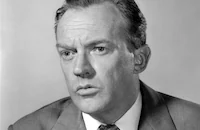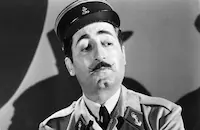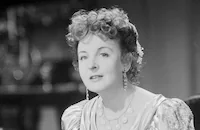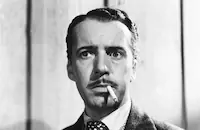Devotion

Brief Synopsis
Cast & Crew
Curtis Bernhardt
Ida Lupino
Paul Henreid
Olivia De Havilland
Sydney Greenstreet
Nancy Coleman
Film Details
Technical Specs

Synopsis
In the early 1800s, sisters Charlotte and Anne Brontë prepare to leave their sister Emily, their brother Branwell and their aunt and vicar father to work as governesses. Charlotte and Anne want to experience life outside their home as preparation for their careers as writers. Branwell is a talented, temperamental painter who is coddled by his sister Emily, and Charlotte and Anne plan to give the money they earn as governesses to him, so that he can go to London to study art. One night while Bran is getting drunk at a local tavern, Arthur Nicholls, his father's new curate, arrives. Bran insists that Arthur accompany him to the vicarage. At first Arthur refuses, believing that it is too late in the evening, but then, seeing how drunk Bran is, accompanies him. Emily answers the door and mistakes Arthur for one of Bran's drunken friends. The following day, after Bran leaves for London, Arthur reappears. After he is greeted by the unwelcoming Mr. Brontë, Emily's mistake is cleared up and she and Arthur become friends. One day, Emily shows Arthur a lonely house, which has inspired her novel, Wuthering Heights . After some time passes, a disillusioned Bran returns home, blaming his sisters for his failure as an artist. Charlotte and Anne also return home. At a dance at the neighboring Thornton house, Arthur is struck by Charlotte's beauty. When Charlotte realizes that Emily is interested in Arthur, she becomes interested as well. Later, a drunken Bran disrupts the dance, and Arthur takes him home. Learning that Charlotte wants to take Emily to Brussels to further their educations, Arthur secretly buys a painting from Bran, and the money enables the sisters to go to Europe. Emily hopes that Arthur will ask her to stay behind, but he has fallen in love with Charlotte and will not comply. At the school of Monsieur and Madame Heger in Brussels, Charlotte admits to Emily that she received unwelcome attentions while she was a governess and that later, Arthur kissed her. Emily is heartbroken by the news. That night, Emily dreams about the moors and a threatening black horseman. Later, Heger takes Charlotte to an exhibition and kisses her. When she returns to the Hegers', Emily is packing, having received a letter from Anne saying that Bran is ill. Back in England, Charlotte and Emily both write their books. After Branwell reads them, he tells Emily that they are both in love with the same man. Later, the sisters learn that Arthur bought the painting that financed their trip to Europe, and Emily insists that they repay him. One day Emily goes out in the rain looking for Bran. She finds him shortly before he collapses and dies. Wuthering Heights and Charlotte's book, Jane Eyre , are both published under male pseudonyms. Despite the fact that Charlotte's sells best, famous author William Makepeace Thackeray believes that Emily's is the greatest. Thackeray meets Charlotte and introduces her to London society. She convinces him to take her to the poverty-stricken East End, where Arthur now works. Arthur admits to Charlotte that he loves her, but because Emily loved him, he felt he could not stay in Yorkshire. Learning that Emily is very ill, Charlotte hurries home and arrives in time to say goodbye before her sister dies. Later, Arthur returns for Charlotte.

Director

Curtis Bernhardt
Cast

Ida Lupino

Paul Henreid

Olivia De Havilland

Sydney Greenstreet

Nancy Coleman

Arthur Kennedy

Dame May Whitty

Victor Francen

Montagu Love
Ethel Griffies
Edmond Breon
Odette Myrtil

Doris Lloyd
Marie Debecker
Donald Stuart

Eily Malyon
Forrester Harvey

Billy Bevan
John Meredith
Geoffrey Steele
Frank "pancho" Willmarta

Harry Cording
Eric Wilton
David Thursby
David Clyde
P. J. Kelly
Glen Cavender
Hilda Plowright
Elspeth Dudgeon
Donald Dewar
Violet Seton
Rita Lupino
Sonia Lefkova
Elyane Lima
Sylvia Opert
Anne Goldthwaite
Irina Semochenko

Micheline Cheirel
Jeanne Romer
Marcel De La Brosse
William Austin
Evelyn Beresford
Richard Neill
Flo Wix
Kathleen O'malley
Sheila O'malley
Lydia Bilbrook
Wallis Clark
Reginald Sheffield

Brandon Hurst
Florence Gill

Boyd Irwin
Craufurd Kent
Frank Dawson
Edgar Norton
Yorke Sherwood
Connie Leon
Crew
Milo Anderson
Robert Buckner
Rudi Fehr
Leo F. Forbstein
Robert M. Haas
Ernie Haller
Jesse Hibbs
Jack Holden
Stanley Jones
Erich Wolfgang Korngold
James Leicester
Jack Oakie
Theodore Reeves
Casey Roberts
Don Siegel
James Vincent
Jack L. Warner
Perc Westmore
Rex Wimpy
Keith Winter

Videos
Movie Clip



Trailer
Hosted Intro
Film Details
Technical Specs

Articles
Devotion (1946) - Devotion
Critics and literary scholars hated Devotion, and likely still do, because of the liberties it takes. Considered on its own terms, however, Devotion isn't bad, even if it doesn't achieve the heights that studio chief Jack Warner envisioned for it. In the works for two years before filming started, it ended up sitting on a shelf for two more years after filming ended.
One of the best things about the film is its cast, with Ida Lupino, Paul Henreid and Arthur Kennedy particular standouts. Director Curtis Bernhardt later recalled, "The best part in the movie was that of the brother [Branwell Bronte]. Arthur Kennedy played it beautifully. He played it to the hilt. Lupino was also good as Emily, the most talented of the sisters...She had a fine sense of humor. She always called me 'Ducky.'" Bernhardt found Olivia de Havilland (Charlotte Bronte) much more difficult to work with, describing how she fought him on the simplest staging instructions. "Lupino," he said, "was more accessible artistically than de Havilland during the making of the film. De Havilland became really obnoxious."
According to Paul Henreid, there was plenty of nasty feuding going on behind the scenes. In his memoir Ladies Man, he described his fondness for Lupino and his distaste for the mind games played by de Havilland and even Jack Warner. "Stars are not vulnerable women," he wrote. "To get to the top you must have an aggressive nature. But of all the women I worked with, Ida Lupino seemed the most vulnerable. She was a soft person with a great sense of sweetness about her, but anything that might have developed between us was destroyed by Olivia's machinations."
Henreid suspected that de Havilland told Bernhardt that Lupino was behind a rumor that Bernhardt was to be replaced by Lewis Milestone. In truth, both actresses concocted the story in an attempt to get Bernhardt to loosen up on set - because, Henreid wrote, "Kurt was a good director but had a touch of arrogance about him, a brusqueness that could be hurtful."
Henreid also recounted a "dirty trick" that Jack Warner played on Lupino. Warner planned to give her top billing because she was the bigger star, but he wanted to have de Havilland end up with Henreid at the film's climax because winning the leading man's heart would help build de Havilland's stardom, and her future box office power. Warner gave Lupino a script that ended with her character's death but did not include a final scene between Henreid and de Havilland.
"When Ida saw the final version," Henreid wrote, "she was furious. 'I've always been your friend, Paul. How could you do this to me?' 'What are you talking about?' I asked, genuinely puzzled. 'You knew they were shooting another ending,' she answered furiously. 'But I didn't know. My script always had that ending in it. I had no way of knowing that yours didn't.' Ida began to weep. 'But Olivia said you did know!' I realized that Olivia too was in on the trick and was trying to shift some blame onto me. 'Ida,' I said, 'I swear to you that I didn't know, and if I had, I'd have told you. Olivia is a troublemaker!'
"'Oh, Paulie!' And Ida, still crying, came into my arms to be comforted."
Both Henreid and Lupino later became directors themselves, with Lupino helming her first feature in 1949 and Henreid following in 1952. Both directed films and television into the late 1960s.
Devotion was Olivia de Havilland's last film under contract with Warner Brothers. After production, however, the studio told her she still owed six months' worth of work, even though her seven-year contract was up. The reason? She had previously been placed on suspension for refusing to take roles assigned to her, and the studio said she had to make up the suspension time. De Havilland sued, and the courts agreed with her, ruling that the state Anti-Peonage law which limited employer-employee contracts to seven calendar years applied to studios and actors as well. Seven years was seven years, regardless of suspensions. It was a landmark legal victory and came to be known as "the de Havilland decision." When de Havilland finally returned to work after this long court process, it was in Paramount's To Each His Own (1946), for which she won the Oscar® for Best Actress.
Devotion was the last film for actor Montagu Love, who died shortly after production at age 66. A notorious villain of the silent screen, Love hit his peak in the late 1920s playing opposite John Barrymore and Rudolf Valentino, and he went on to supporting roles in dozens of sound era pictures including The Prisoner of Zenda (1937), The Adventures of Robin Hood (1938) and The Mark of Zorro (1940).
The Bronte sisters have been portrayed on film and TV numerous times over the years. In 1944, a 20-minute short entitled Three Sisters of the Moors was released prior to Jane Eyre (1944) as a way of promoting that feature. Other productions include a 1973 British miniseries (The Brontes of Haworth), a 1979 French feature (The Bronte Sisters), and a 1983 television movie (Bronte). As of 2007, a new feature film currently entitled Bronte is in the works.
Producer: Robert Buckner
Director: Curtis Bernhardt
Screenplay: Theodore Reeves, Keith Winter, Edward Chodorov
Cinematography: Ernest Haller
Film Editing: Rudi Fehr
Art Direction: Robert M. Haas
Music: Erich Wolfgang Korngold
Cast: Ida Lupino (Emily Bronte), Paul Henreid (Arthur Nicholls), Olivia de Havilland (Charlotte Bronte), Sydney Greenstreet (William Makepeace Thackeray), Nancy Coleman (Anne Bronte), Arthur Kennedy (Branwell Bronte).
BW-107m. Closed captioning.
by Jeremy Arnold

Devotion (1946) - Devotion
Quotes
Trivia
This film was actually made in 1943, but not released until 1946.
Notes
The film begins with the following written foreword: "A century ago there lived upon the Yorkshire moors of England three sisters and a brother. All of great talent-and two with genius. Their name was Brönte. Their novels are classics which will endure forever-but they themselves lived a story as rare and remarkable as any they dreamed." The Brontës grew up in the industrial town of Haworth, Yorkshire, where their father was rector. After the death of their mother, they were cared for by their aunt, Elizabeth Branwell. Mainly educated at home, both Charlotte and Anne worked as governesses. As in the film, Charlotte and Emily attended the Pensionnat Heger in Brussels for nine months, and Charlotte fell in love with the married Heger, but unlike in the film, Heger did not return her feelings.
In 1847, Charlotte's novel Jane Eyre was published under the pseudonym, Currer Bell, and later that year, also using pseudonyms, Emily and Anne published Wuthering Heights and Agnes Grey, respectively. In 1848, at the age of thirty-one, Branwell, who was a heavy drinker and opium user, died from tuberculosis. Emily died shortly afterward, also from tuberculosis. Anne, who suffered from the same disease, wrote a second novel, The Tenant of Wildfell Hall, before her death in 1849. Charlotte published two more novels and in 1854, married her father's curate, Arthur Bell Nicholls. She died in 1855 while pregnant.
Although onscreen credits list Theodore Reeves as the sole author of the original screen story, a July 21, 1934 Hollywood Reporter news item reported that Warner Bros. had purchased a story entitled "Devotion," based on the lives of the Brontë sisters, written by Michael Varod. A July 24, 1939 Hollywood Reporter news item credits Theodore Reeves and Edward Beaudine with the original story idea. The contributions of Varod and Beaudine to the completed film have not been determined.
In a April 10, 1939 Los Angeles Examiner column, Louella Parsons reported that Bette Davis would play "Charlotte," Geraldine Fitzgerald "Emily" and "Anne" would be enacted by Olivia De Havilland. At that time, Claude Rains was to play their father; James Hilton was to write the screenplay; and Edmund Goulding was assigned to direct. On February 25, 1942, Los Angeles Times announced that the film was to star Joan Fontaine as "Charlotte" alongside her real-life sister De Havilland.
The film was completed in 1943, but its release was postponed until 1946, possibly due to the legal case filed by De Havilland in August 1943. Devotion and Thank Your Lucky Stars, for which she did a cameo, (see below) were the last films that De Havilland made at Warner Bros. after eight years at the studio. Information from the Warner Bros. legal files indicates that shortly after production ended on Devotion De Havilland was put on suspension for the fifth time in three years for refusing a film (see entry One More Tomorrow below). Her last action for Warner Bros. was fulfillment of a loan contract made by the studio with producer David O. Selznick, exchanging De Havilland for the services of Ingrid Bergman in Casablanca. Selznick sold his rights to De Havilland to RKO, where between May and August 1943 she performed in Government Girl (see below). In mid August 1943, De Havilland was again suspended by Warner Bros. for refusing to fulfill a loan-out obligation to Columbia studios (no property was agreed upon) and on August 24, 1943 De Havilland filed suit against Warner Bros. asking for declaratory relief, claiming that her seven year contract period expired in May 1943 and that California law forbade employers enforcing a contract beyond seven years. Warner Bros., as all other studios at that time, regularly extended actors' contracts by the length of suspension periods and claimed De Havilland owed them an additional 25 1/2 weeks.
The suit went to trial in November 1943 and in March 1944, the California Superior Court found for De Havilland. Warner Bros. appealed and successfully kept De Havilland from employment in motion pictures, radio and theater throughout 1944, while also pursuing the possibility of enforcing her contract outside California. De Havilland sued to have an early appeal decision so she might resume employment, and in December 1944 the Court of Appeals sustained the Lower Court's verdict. Warner Bros.' request for review of the decision by the Supreme Court was denied based on the decisions of the two lowers courts. The decision has variously been known as the Anti-Peonage Law or the De Havilland Decision. De Havilland resumed work in motion pictures in January 1945, performing in Paramount's The Well Groomed Bride (see below), which was released in 1946, one month after Devotion.
A Lux Radio Theatre presentation of Devotion starring Jane Wyman, Ida Lupino and Vincent Price, was broadcast on February 17, 1947.
















